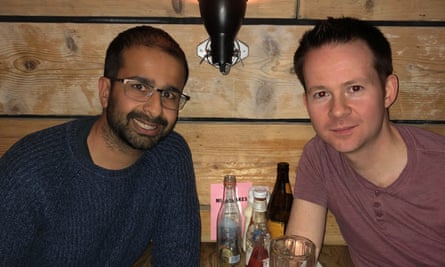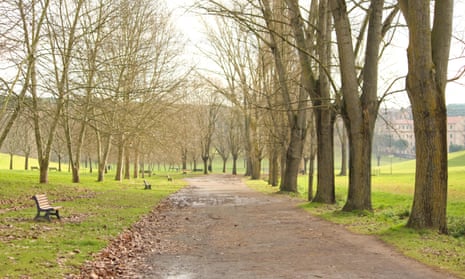I’d never said goodbye to a man before. Not a man like David, anyway. A man I had been so close to, a man with whom I had shared so much of myself. But now it was time to say goodbye. So I stood up, leaned forward and shook his hand. I smiled, he smiled, and I walked out of the door, almost certainly never to see him again.
A total of 20 times, stretching from spring to autumn, each for precisely 50 minutes: those occasions David and I spent together will live with me forever. Part of me wonders how I will cope without him, but I know there’s nothing else he can do for me now. And there are no regrets, because seeking help was exactly the right thing to do. David was kind and attentive from the start, and while he knows an awful lot more about me than I do about him, I don’t feel used in the slightest.
Counselling is not for everyone, but it was for me. I desperately needed it during what has been the most difficult period of my life. So much has happened this year and there is, I know, so much more to come. But I feel ready to take it on because of what I’ve been through.
I still remember the moment crisis hit. It was a Wednesday afternoon in mid-February and I was on my way to Leicester Square to watch the sequel to Trainspotting when a great sadness overwhelmed me. In truth it had been stirring for some time but now its grip was suffocating, and I was struggling to breathe. So I got off at Elephant and Castle tube station and called someone I knew who was going through long-standing difficulties relating to mental illness and asked for his advice. The message was simple: seek help – immediately.
I booked an appointment with a GP and was referred to David. Our first session took place in early May. Even now, after my final session, I’m not sure if I was – and still am – suffering with depression; I was never officially diagnosed. It’s certainly possible, and during the summer, at the height of my troubles, I was prescribed the antidepressant sertraline which after some initial discomfort (painful headaches, problems staying asleep), has had a significantly positive effect. I continue to take it now.

Seeing David on a weekly basis may well have saved my life, because it got very dark. I will never forget the Friday afternoon in July when I lay on a bench in open woodland near my parents’ house in north London looking up at the sky. It began to rain, and although part of me wanted to get up and go home I just stayed there, practically motionless, my legs dangling over the edge. I felt empty, fed up, devoid of happiness. The rain was having no effect, I was numb to it and considered ending it all there and then.
Would I have gone through with it? Perhaps not, but the fact I was considering it was enough. This was rock bottom and for the sake of my family and friends, and my wife and daughter in particular, I had to rise up.
David helped enormously. He listened and allowed me to unload my burden of anger, longing and sadness. I’m 36 years old, married, a father, a homeowner and a sports journalist. It’s a lovely, rewarding, stimulating life, but it’s also very grownup. And as anyone who is very grownup will tell you, being very grownup can be, well … boring.
Routine kicks in and can completely take over. Thankfully I love my job, and have a regular release in my lifelong interest in Liverpool Football Club that sees me spending many hours travelling up and down the country to watch them play. But something else, something very important has all but gone – my friends.
It creeps up you on. When you’re in your 20s you imagine nights in the pub, long weekends in far-off lands and chains of giggle-inducing messages with people with whom who share a common way of thinking will last forever. But you get older, some of you get married or have children, and gradually the ties weaken. Contact reduces, chains of messages become one here or there, and before you know it, months have passed without you seeing or speaking to people you once couldn’t go more than two days without. That’s life – people get older, their priorities and responsibilities shift, but that doesn’t make it easy.
I’m fully aware this is a first-world problem. Perhaps you’re wondering: “Is it possible that your friends just don’t like you any more?” Well, maybe. But I will not apologise for suffering with this particular kind of loneliness. I love my wife and daughter, and seeing the latter grow into an utterly wonderful person has and will be the greatest experience of my life. She’s six years old, loves reading and dancing to Drake, hates nuts (claims she’s allergic – she’s not) and isn’t into Peppa Pig as much as she once was. Every day she makes my heart glow.
But there’s still only so many times you can mow the lawn, clean the bathroom, put out the bins, do the school run and stand awkwardly next to a fellow dad in the local park before you need a break from it all.
And that break is your friends. That’s why, after I got married in 2009 and became a father in 2011, I tried to see them as much as possible, so much so that last year I sent an email outlining my determination to do so. A plan was put in place – we were to meet once a month, with a different person organising each outing. Everyone agreed, everyone was up for it … and then it petered out after two gatherings.
I’ve seen most of them since but not as a group, and each meeting was somewhat fleeting. It’s not how it once was and that has left me feeling sad, angry and, yes, lonely.
I discussed all this with David, which led to me accepting it was a problem, and one cause for the slump I have found myself in this year. Can it be fixed? Probably not. But by recognising the problem I have released the internal angst and realised that things are not as bad as all that. After all, I do still see my friends and have a lot of other people in my life whose company I enjoy immensely. I feel better now.
And so can you. Ignore the cynics who dismiss mental illness as a fad. It’s real, caused by complex emotions and circumstances, including feeling lonely through an absence of friendship. There is nothing to be ashamed of, no rights and wrongs when it comes to your wellbeing. It’s only by coming to terms with their feelings that sufferers can avoid sliding into a dark, potentially tragic place.
I miss my friends, I miss seeing them and speaking with them. And I refuse to feel guilty for writing that here or for saying it out loud, to David.
Sachin Nakrani is a Guardian sports editor and writer.
In the UK, Samaritans can be contacted on 116 123. In the US, the National Suicide Prevention Lifeline is 1-800-273-8255. In Australia, the crisis support service Lifeline is 13 11 14. Other international suicide helplines can be found at www.befrienders.org.

